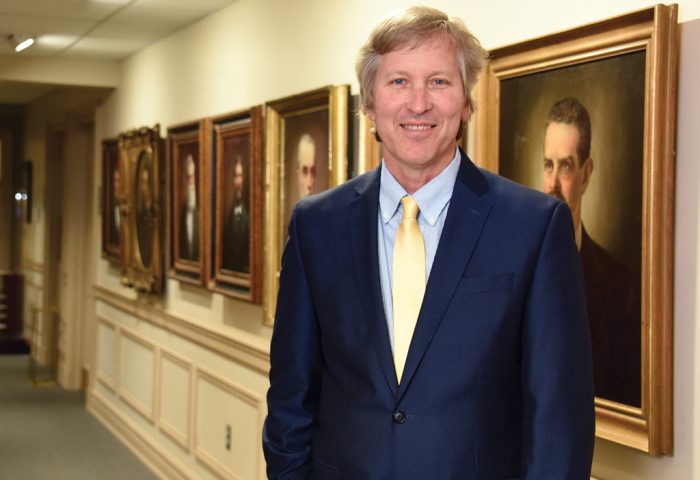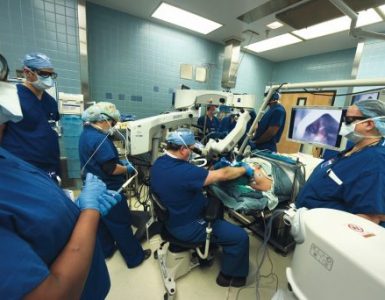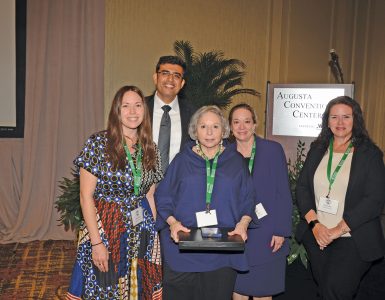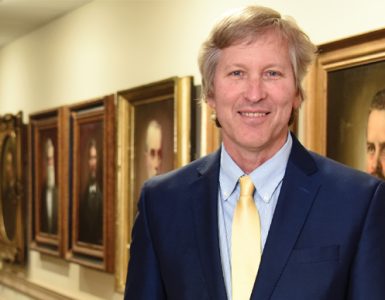The last week of April was already going to be a good one. As so many of you know, that meant Alumni Weekend was here and just a great opportunity for you, our graduates, to come home. It’s also just a great time for those of us already here to celebrate the Medical College of Georgia’s long and storied mission of educating physicians like you.
It turned out that week, I was also to learn I had been named MCG’s 27th dean. It was interesting to find myself so excited and humbled by getting a job I never sought. I took the job as interim dean in January when asked because I really do love your medical school. In fact, despite being a proud 1983 graduate of the University of Maryland School of Medicine, I also consider MCG my medical school. I came here for residency and fellowship and stayed here for reasons most of you likely know.
There is something about MCG, its name, its legacy, its people, that makes it feel like family really. Also like family, MCG is not perfect, but the DNA is exceptional. Without a doubt, MCG has the best students, residents, faculty, staff and alumni anywhere. I believe that together we will work even harder to make this already great medical school the best that it can be.
I appreciate the confidence of Augusta University President Brooks Keel in giving me this opportunity and all of you for helping make this medical school one that anyone would be proud to lead. I will definitely need your insight and support moving forward.
Please know that it is now also my privilege to be part of a great leadership team that is working to better align our medical school, hospitals and faculty practice plan so that all work more synergistically to ensure the best care for patients and the best education for students and residents.
Positive change is already happening at your alma mater. Very recently, the university made the administrative decision to also more closely align the Georgia Cancer Center with MCG. Like any strategic move, it was a decision based on facts and the future. The vast majority of the faculty at the cancer center are MCG faculty. The majority of National Cancer Institute-designated cancer centers in this nation are part of a medical school, and closer collaboration will enable us to advance more quickly our contributions to the war on cancer. We have initiated a national search for a new cancer center director, who will help us build on the strengths of the many fine individuals already there and move this important fight forward.
This summer we start Georgia’s first gynecologic oncology fellowship, a three-year program directed by Dr. Bunja Rungruang in the Department of Obstetrics and Gynecology. Dr. Heather Williams, an OB/GYN resident at the University of Iowa Health Care, is our first fellow, and we will eventually be training three fellows in the ACGME-approved program. The new fellowship is a great and logical step for our Section of Gynecologic Oncology, led by Dr. Sharad Ghamande. The section is a leader in the state and nation in clinical trials for these cancers, including a new study of a therapeutic cervical cancer vaccine for patients at high risk of recurrent disease. Dr. Ghamande, who also is associate director of clinical research at the Georgia Cancer Center, is a great example of the combined effort of the medical school and cancer center and the potential for even more.
Near press time for your alumni magazine, we got more great news about a new $9.3 million Program Project grant from the National Institutes of Health. The grant will enable Dr. Carlos Isales, vice chair of our Department of Neuroscience and Regenerative Medicine, and a strong team of colleagues to learn more about why our bones and muscles become more fragile as we age and what they might do to intervene.
There will be much more about that in the next issue of MCG Medicine. In this issue you will find more about another recently awarded Program Project, led by Dr. Clinton Webb, our chair of the Department of Physiology, exploring the irony that high blood pressure causes increased cell death, resulting in more cell debris that further raises our blood pressure. These two large grants in areas so impactful to our health are indicative of the great cooperation in science here and the overall great future you are helping us build.
Of course, at MCG, we always come back to our purest reason for being: our students. It is my great honor to also share that yet again, our students were very competitive in the National Resident Matching Program. Our seniors’ match rate once more surpassed the national rate. They are fanning out to 38 states; 28 percent of our seniors will remain in Georgia for the next phase of their education, and 17 percent will remain at MCG and AU Health or other MCG-affiliated residencies like at St. Mary’s and Athens Regional or Wellstar/Kennestone in Atlanta, some of our newest educational partners. One hundred of the 211 participating seniors will join, at least initially, a primary care residency. Top specialties also include emergency medicine, OB/GYN, general surgery, orthopaedics, ophthalmology, radiology and neurology.
As you know, their Hooding, which followed May 11, was probably the only day that equaled or surpassed their joy at the Match.
I thank you for your support of MCG and look very forward to getting to know many of you better. Please always let me know your hopes and concerns for your medical school.
Respectfully yours,
David C. Hess, MD
Dean, Medical College of Georgia Executive Vice President for Medical Affairs and Integration,Augusta UniversityPresidential Distinguished Chair
David C. Hess, MD
EDUCATION/TRAINING
Undergraduate degree, Johns Hopkins University
Medical degree, University of
Maryland School of Medicine
Neurology residency and cerebrovascular fellowship, MCG
EXPERTISE
Joined MCG in 1990; Department of Neurology chair since 2001
Board-certified in internal medicine, neurology and vascular neurology
PROFESSIONAL ACTIVITY
More than 170 peer-reviewed publications, with NIH- and private sector-funded research
Steering or advisory committees of three international clinical trials
Co-founded telestroke company REACH Health, Inc. in 2006, which received a 2012 Georgia Bio Community Award
Longtime member of the American Stroke Association’s Telestroke Committee and recently completed a term on the American Board of Psychiatry and Neurology’s Vascular Neurology Board Examination Committee
Associate editor of the journal Translational Stroke Research and an editorial board member of Stroke and Stroke and Vascular Neurology, among others
ACCOLADES
Received MCG’s Outstanding Faculty Member Award and Distinguished Research Award from the AU Research Institute in 2012
Received multiple Exemplary Teaching Awards for Medical Student Education and a Distinguished Faculty Award for Clinical Science Teaching from MCG students
One of America’s Top Doctors for the past 16 years
Named Presidential Distinguished Chair in 2008










